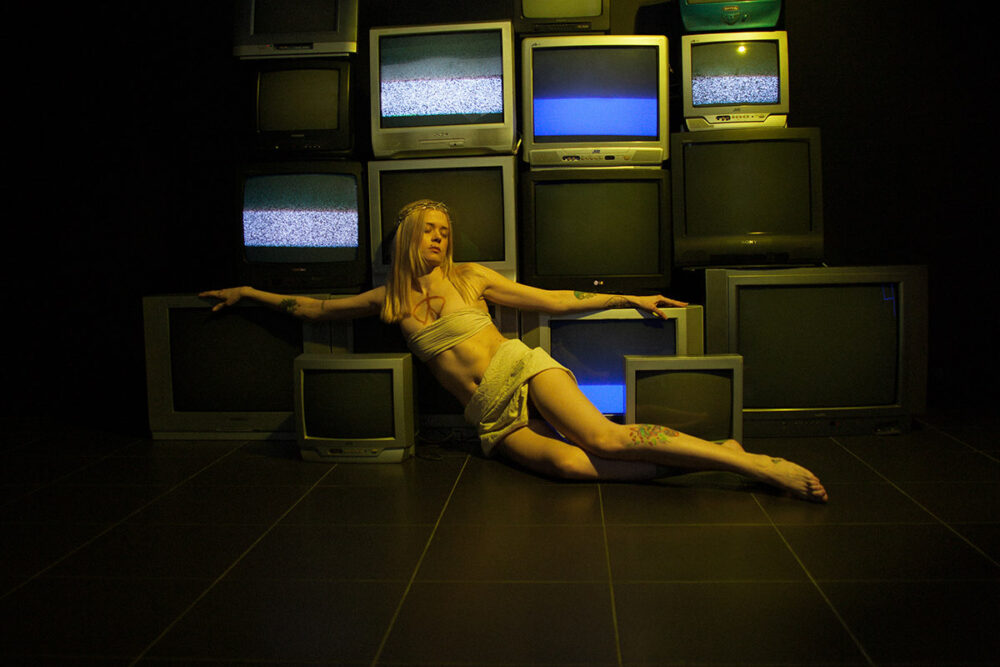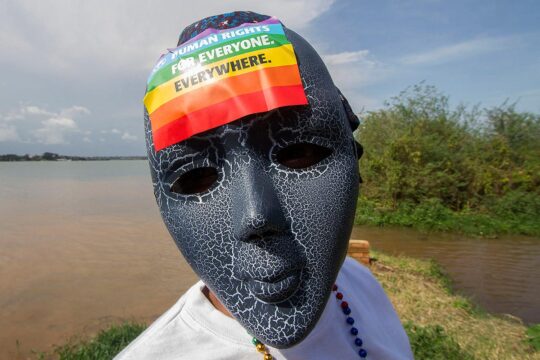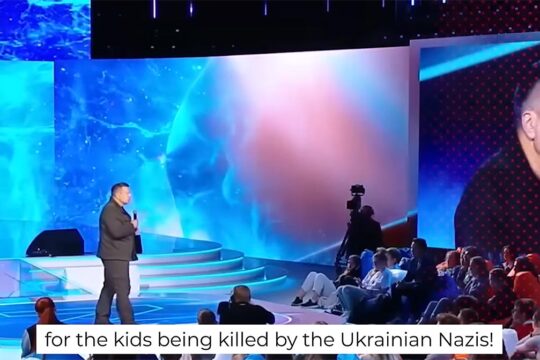The first law banning “propaganda” for LGBT [lesbian, gay, bisexual and transgender people] in the Federation of Russia was passed back in 2013. It was aimed at protecting children and prohibited the dissemination of information that could create a positive image among them of “non-traditional sexual relationships”. In 2014, the law was reviewed by the Constitutional Court of Russia. The court clarified that propaganda means “the intentional and uncontrolled spread of information that can harm the health, moral, and spiritual development” of children. It could, the court argued, lead them to develop “distorted ideas about the social equivalence of traditional and non-traditional sexual relationships”. At the same time, the court noted that information about LGBT could still be presented to children, but only in a neutral manner.
After Russia’s full-scale invasion of Ukraine in February 2022, the situation for LGBT people drastically changed, notes Max Olenichev, a human rights lawyer who works with the Russian LGBT community. “When the Russian state failed to capture Ukraine within a few weeks, it began constructing the image of an internal enemy,” he says. “This was necessary to rally Russian society around the government and divert attention from military setbacks to ‘internal enemies’. Among those labeled as such were LGBT people.”
President Vladimir Putin in person played a significant role in shaping the evolving narrative around LGBT issues. In 2020, Russia held a vote on amending the Constitution. In addition to a provision that reset presidential term limits, allowing Putin to run for re-election in 2022, other changes were introduced. One of these constitutional amendments was to define marriage exclusively as a “union between a man and a woman”.
In November 2022, the president signed the “Fundamentals of State Policy for the Preservation and Strengthening of Traditional Russian Spiritual and Moral Values”. While the document does not carry direct legislative power, it established a broad ideological framework at the state level. It explained that the “promotion of non-traditional sexual relations” was foreign to the Russian people and described such ideas and values as destructive to Russian society. The document’s adoption was justified as a matter of “ensuring national security”.
Not just children
In December 2022, Russia extended the legal ban on “gay propaganda” to adults. De facto, it refers to any positive or neutral statement about LGBT people in the public sphere, even in a group chat of just a few people. In August 2024, two human rights organizations, Sphere and Citizen’s watch, which advocate for LGBT rights in Russia, published a study analyzing how courts have applied these laws in recent years. According to the study, from December 2022 to March 2024, Russian courts reviewed 64 such cases. 47 were related to the “propaganda of non-traditional sexual relationships” in general, and 17 cases were about spreading information about LGBT issues to minors.
According to the same study, 59% of the defendants were individuals, while 27% were legal entities. Among the latter, online streaming platforms were most often targeted in court. For example, in September 2024, the streaming service Kinopoisk (one of the largest in Russia, owned by the IT company Yandex since 2013) was fined 3 million rubles (around 29,000 euro) for promoting non-traditional sexual relationships. The platform featured Gaspar Noé’s film “Love”. The movie was banned from cinemas in Russia due to its explicit sexual content.
LGBT movement dubbed “extremist organization”
In November 2023, Russia’s Supreme Court, following a request from the Ministry of Justice, labeled the “LGBT movement” as an “extremist organization”. People can be held accountable for publicly displaying “extremist symbols”. For example, this could include a photo of a rainbow flag posted on social media or a rainbow-colored accessory noticed by police on the metro. Penalties include fines of up to 2,000 rubles (around 20 euros) or up to 15 days of arrest. There are also criminal charges: incitement to extremism (up to four years in prison), organizing an extremist community (up to eight years), or organizing the activities of an extremist organization (up to ten years). Alongside the “LGBT movement”, the list of extremist organizations includes ISIS, the Taliban, Jehovah’s Witnesses, the Ukrainian Azov battalion, and others — 611 entries in total.
“In Russia, the system of restrictions and repression is not set up in a way that immediately prosecutes all LGBT people and their allies,” explains lawyer Olenichev. “The government has passed many restrictive laws, but it lacks the resources to enforce them on every citizen. Instead, it creates high-profile cases to send a message to society: what behaviour is acceptable and what is not. For now, society adjusts to the new rules, self-censoring its own actions.”
According to the human rights defender, at least 30 people have already been held accountable for displaying LGBT symbols in Russia. Additionally, there have been at least three criminal cases opened. In March 2024, the Central District Court of Orenburg placed the owner of the local club Pose, Vyacheslav Khasanov, club administrator Diana Kamillanova, and art director Alexander Klimov in pre-trial detention. In May, a criminal case was launched against Artem Fokin, president of the Samara LGBT initiative Irida, and in August against the director of a medical center in Ulyanovsk (his name was not mentioned). None of these cases have yet reached court for substantive review.
At the same time, Russian law and its application still do not equate being LGBT with extremist activity, Olenichev notes. One can have a relationship, but not talk about it publicly, not kiss in the streets, not wear LGBT symbols on your clothes. Simply having such a relationship in Russia is not considered illegal.
First case against a feminist photographer
The first case following the designation of the “LGBT movement” as an extremist organization was initiated in Saratov, western Russia, at the end of 2023. Fine art photographer Inna Mosina was accused of “displaying the symbols of an extremist organization”, because of several images posted on her Instagram account, including a self-portrait with a small rainbow flag posted six years ago, a creative video featuring an astronaut holding a rainbow flag, or a rainbow emoji in her profile bio.
The indictment explains that on December 13, 2023, an officer found these images on Mosina’s Instagram. The Ministry of Internal Affairs’ Center for Combating Extremism tasked a district police officer with handling the case. In Russia, district officers typically deal with everyday crimes like noisy neighbours or scratched cars in parking lots. Dealing with this new category of cases proved challenging for the officer. When drafting his report, he used a template meant for Nazi swastika displays, spent days without acting, and consulted extensively with his chief and colleagues in Moscow. “It even seemed like the officer was a bit embarrassed to have to charge me for that,” Mosina recalls.
Before that, “since around 2020, strangers began collecting screenshots of my work, writing posts about me in Telegram channels, and somehow always predicting that I would get 10 years in prison. There were complaints filed against me, and I was summoned to the Center for Combating Extremism for ‘discrediting the army’,” the fine art photographer recounts.
Eventually, her case was transferred to court. Officers presented their conclusion during the court hearing, giving her no chance to review it beforehand to prepare her defence. After several hearings, in February 2024, the Leninsky District Court of Saratov found Mosina guilty and fined her 1,500 rubles (15 euros). Initially, she planned to stay in Russia and continue her work as an artist. However, after the death of opposition politician Alexei Navalny, she lost faith in the idea of a “good and happy Russia”, and by February 17, 2024, she began preparing to leave the country. This September, as she was leaving Moscow, Mosina was questioned by the FSB at the border: “Before leaving, I once again stated that I was against the war. After a while, they eventually let me out of the country.”
Challenge at the UN
Max Olenichev, who assisted Mosina, states that Russian courts committed multiple violations during her trial. He is currently preparing a complaint to the United Nations Human Rights Committee, arguing that the state’s interference with Mosina’s right to free expression contradicts Russia’s international obligations. “According to the International Covenant on Civil and Political Rights, the state cannot simply prohibit the dissemination of information,” Olenichev explains. “It must assess whether such interference is necessary, whether it meets the standards of a democratic society, and whether it serves the purposes outlined in the Covenant. In Mosina’s case, these requirements were not met.”
The UN Human Rights Committee, with a few other UN committees of the UN, is one of the only international bodies where Russians can still submit their complaints. Until March 2022, Russia was a member of the Council of Europe, and the European Court of Human Rights (ECHR) had jurisdiction over the country. However, Russia is no longer a Council member and is not complying with the court’s rulings, refusing to pay financial compensation or to amend its national legislation.
“We are confident we will win,” Olenichev says about the prospects of the case in the UN Committee. “Then, the process of enforcing the decision by the Russian Federation will begin. It seems the Committee’s decision will likely be enforced in a different Russia.”






